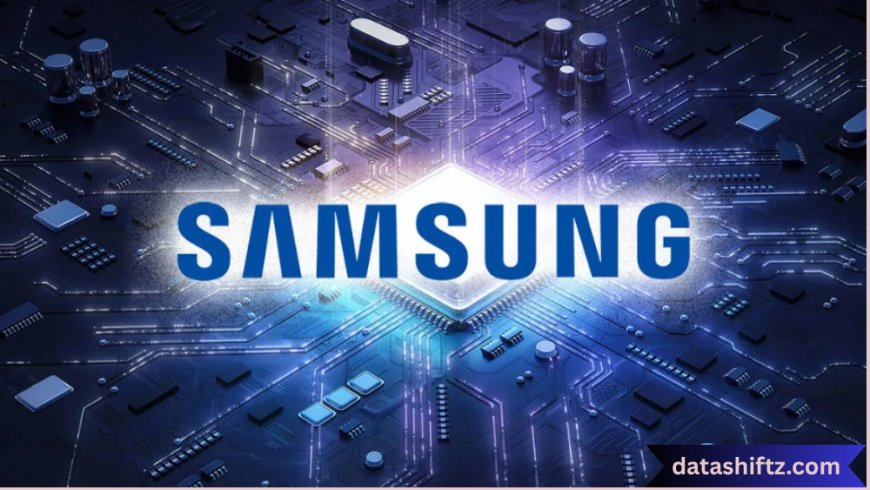Samsung: The Global Tech Giant Redefining Innovation

Introduction
Samsung is a name that resonates with innovation, reliability, and futuristic technology. Headquartered in Suwon, South Korea, Samsung Electronics is one of the world’s largest producers of electronic devices. From smartphones and televisions to semiconductors and home appliances, the company has made an indelible mark across various tech sectors. With a strong global presence and continuous investments in research and development, Samsung is not just a brand—it’s a revolution that touches billions of lives worldwide.
The Evolution of Samsung: From Trading Firm to Tech Titan
Samsung was founded by Lee Byung-chul in 1938 as a trading company dealing in groceries, dried-fish, noodles, and other goods. Over the decades, it underwent major transformations, diversifying into numerous industries, including textiles, insurance, food processing, and eventually electronics.
Key Milestones in Samsung's History
| Year | Milestone |
|---|---|
| 1938 | Founded as a trading company in Daegu, Korea |
| 1969 | Samsung Electronics was established |
| 1983 | Entered semiconductor business |
| 1992 | Became the largest memory chip producer |
| 2009 | Launched the first Galaxy smartphone |
| 2021 | Became the world's largest smartphone vendor (Q1) |
Samsung’s Product Ecosystem
Samsung's strength lies in its diversified portfolio. From handheld gadgets to large industrial solutions, the company creates an interconnected ecosystem of products and services.
1. Smartphones and Wearables
Samsung’s Galaxy series has been a game-changer. The Galaxy S and Note series, along with the foldable Galaxy Z Flip and Z Fold devices, define the brand's commitment to innovation. Its Galaxy Watch and Galaxy Buds compete aggressively with other global tech players in the wearable segment.
2. Consumer Electronics
Samsung has a stronghold in:
-
Smart TVs: With QLED and Neo QLED technologies, Samsung leads the global TV market.
-
Refrigerators & Washing Machines: Known for smart features and energy efficiency.
-
Air Conditioners and Microwaves: Combining sleek design with cutting-edge technology.
3. Semiconductors and Display Technology
Samsung is a leading player in the semiconductor business, supplying DRAM, NAND flash, and System LSI to companies like Apple, Sony, and others. It is also the world’s largest OLED panel producer, used in smartphones, tablets, and TVs.
Innovation and Research—The Heartbeat of Samsung
Samsung invests heavily in R&D, consistently ranking among the top companies globally in terms of annual research budgets. The company runs Samsung Research, a global R&D hub with over 20,000 researchers worldwide.
Areas of Focus:
-
Artificial Intelligence (AI): Personal assistants, machine learning, and automation.
-
5G and 6G Technologies: Pioneering the future of mobile connectivity.
-
IoT (Internet of Things): Creating a seamlessly connected smart home ecosystem.
-
Sustainability: Developing eco-friendly packaging, energy-efficient products, and recycling initiatives.
Samsung’s Global Impact: Presence and Market Reach
Samsung operates in over 80 countries and has manufacturing plants in Vietnam, India, China, South Korea, and the USA, among others. Its products cater to a broad customer base, from budget-friendly to premium segments.
Samsung in India:
India is a crucial market for Samsung, which has established one of its largest mobile manufacturing facilities in Noida. The company is deeply involved in the “Make in India” initiative and continues to expand its R&D capabilities within the country.
Samsung’s Key Business Divisions and Flagship Products
| Division | Flagship Products |
|---|---|
| Mobile Communications | Galaxy S24 Ultra, Galaxy Z Fold6 |
| Consumer Electronics | QLED TV, Bespoke Refrigerator |
| Semiconductor | Exynos processors, DRAM, NAND |
| Display Solutions | AMOLED Panels, MicroLED Displays |
| Home Appliances | SmartThings, AI-powered washing machines |
Reasons Why Samsung Remains a Market Leader
-
Relentless Innovation – From foldable phones to smart fridges, Samsung sets trends.
-
Diverse Product Line – Caters to a broad demographic and economic spectrum.
-
Advanced R&D Facilities – Massive investment in future technologies.
-
Sustainability Commitment – Promotes green technology and ethical manufacturing.
-
Robust Supply Chain – Global manufacturing and logistics infrastructure.
-
Strategic Partnerships – Collaborations with Google, AMD, and others.
-
Customer-Centric Approach – Offers value, premium support, and local customization.
Challenges and Future Outlook
Despite its dominance, Samsung faces stiff competition from Apple, Xiaomi, Huawei, and emerging tech giants. Global economic uncertainties, supply chain disruptions, and geopolitical issues, especially in semiconductor manufacturing, also pose significant risks.
However, Samsung is focusing on:
-
AI Integration Across Devices
-
Expansion into Electric Vehicles (EV) and Automotive Chips
-
Space Technology and Satellite Communication
-
Advanced Robotics
With strong leadership and a vision of becoming a holistic technology provider, Samsung is likely to remain a key innovator for the next decade and beyond.
Conclusion
Samsung is far more than just a smartphone company—it is a powerhouse of innovation that touches virtually every aspect of modern life. From reshaping consumer electronics to pioneering advancements in semiconductor and display technologies, Samsung continues to lead the charge into the future. With an eye on sustainability, a heart in innovation, and roots in global collaboration, Samsung is not just building devices; it’s building the world of tomorrow.





























